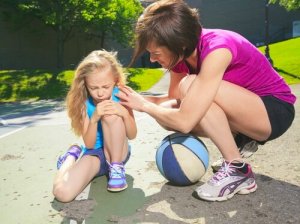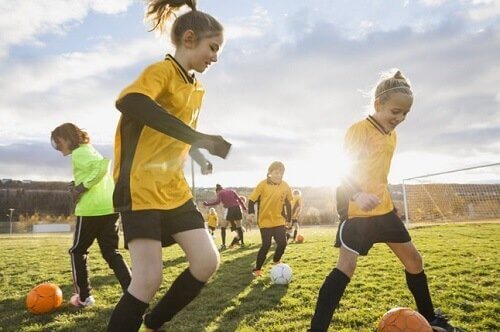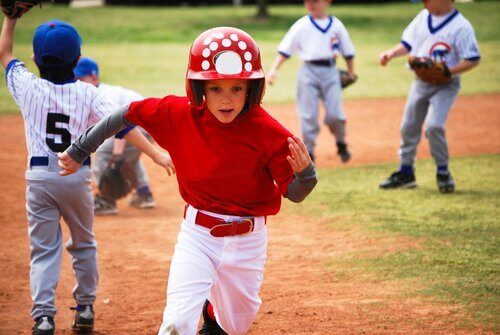Sports Injuries: Why Does My Child Get Hurt So Often?

Sports and playtime activities are important parts of a child’s development. However, if you’ve ever wondered why your child consistently suffers sports injuries, this article contains some useful advice.
The reasons your child may be susceptible to sports injuries may vary depending on several factors.
Reasons behind sports injuries
In this article, we’ll take a look at some of the factors that may cause your child to get hurt while playing sports.
1. Excessive physical demands
One thing that’s important to understand as a parent is that children are totally different from us. This is due to their physical, mental and physiological makeup, as well as a number of other considerations.
Often, children who play sports are asked to do too much for their age. It might be that their muscles and bones aren’t strong enough to withstand the physical and mental stress involved, which can lead to different kinds of injuries.
2. Children between five and 11: weak musculature
At this stage of their lives, children have weaker musculature, good flexibility and less ability to concentrate.
While it’s appropriate for your child to start participating in sports, there should be more of a focus on play. In other words, it’s not a good idea to create overly demanding exercise routines for your child.
Children should never be pressured to participate in a given activity. Rather, they should find it fun. If the child is bored, he or she will concentrate less, which increases the risk of injury.

3. Children between 11 and 15: winning isn’t everything
This is the age when puberty takes place, leading to sudden growth spurts. During this time, children’s aerobic capacity and the volume of oxygen they process increase significantly. In addition, they gain endurance and muscle strength.
With respect to flexibility, it’s unclear whether they lose any during this period of rapid growth or not. It all depends on the particular individual.
This is the age when competitive activities should begin, but be careful not to put too much emphasis on winning and losing. It’s enough that they learn that each activity has a purpose and a goal, and that there are certain rules and regulations they need to follow.
Meanwhile, children should also learn the importance of teamwork in sports and that they need to show their opponents respect and consideration.
4. Children 15 and over: more intense training
During this phase, children stop growing and their muscular development comes to an end. At this point, a child may begin to play sports in a more specialized manner, undertaking more rigorous training without the same risk of injury as before.
“It may be that the child’s muscles and bones aren’t strong enough to withstand the stress of a given sport.”
The role of parents
Parents need to make sure that their children aren’t taking unnecessary risks. In the competitive world we live in, it’s easy to fall into thinking that the sooner your child begins a sport, the better his or her chances are of playing professionally.
In fact, this is far from reality. A child is optimally developed to play sports beginning at the end of adolescence.
Before then, it’s important to make sure they have fun and learn what really matters about sports: that they can help them become functional human beings.
Sports teach children and young people the importance of teamwork, trusting others, defending themselves, resolving differences, following established tules, and striving to achieve their goals.

These values and principles are fundamental to a child’s emotional and psychological development. During this stage of life, it goes far beyond mere physical development.
So if you’ve ever wondered why your child consistently suffers sports injuries, you might ask yourself if you’re asking too much given his or her age. Take note: serious injuries during children’s growth period may affect them for the rest of their lives.
Your child may never fully recover and play his or her favorite sport again. This is a very important aspect of a child’s development.
It’s up to you to take charge. Make sure your children play sports the right way, having fun and learning the proper values. Later on, they can focus more on a given sport and pursue a professional career if that is in fact what they want.
Sports and playtime activities are important parts of a child’s development. However, if you’ve ever wondered why your child consistently suffers sports injuries, this article contains some useful advice.
The reasons your child may be susceptible to sports injuries may vary depending on several factors.
Reasons behind sports injuries
In this article, we’ll take a look at some of the factors that may cause your child to get hurt while playing sports.
1. Excessive physical demands
One thing that’s important to understand as a parent is that children are totally different from us. This is due to their physical, mental and physiological makeup, as well as a number of other considerations.
Often, children who play sports are asked to do too much for their age. It might be that their muscles and bones aren’t strong enough to withstand the physical and mental stress involved, which can lead to different kinds of injuries.
2. Children between five and 11: weak musculature
At this stage of their lives, children have weaker musculature, good flexibility and less ability to concentrate.
While it’s appropriate for your child to start participating in sports, there should be more of a focus on play. In other words, it’s not a good idea to create overly demanding exercise routines for your child.
Children should never be pressured to participate in a given activity. Rather, they should find it fun. If the child is bored, he or she will concentrate less, which increases the risk of injury.

3. Children between 11 and 15: winning isn’t everything
This is the age when puberty takes place, leading to sudden growth spurts. During this time, children’s aerobic capacity and the volume of oxygen they process increase significantly. In addition, they gain endurance and muscle strength.
With respect to flexibility, it’s unclear whether they lose any during this period of rapid growth or not. It all depends on the particular individual.
This is the age when competitive activities should begin, but be careful not to put too much emphasis on winning and losing. It’s enough that they learn that each activity has a purpose and a goal, and that there are certain rules and regulations they need to follow.
Meanwhile, children should also learn the importance of teamwork in sports and that they need to show their opponents respect and consideration.
4. Children 15 and over: more intense training
During this phase, children stop growing and their muscular development comes to an end. At this point, a child may begin to play sports in a more specialized manner, undertaking more rigorous training without the same risk of injury as before.
“It may be that the child’s muscles and bones aren’t strong enough to withstand the stress of a given sport.”
The role of parents
Parents need to make sure that their children aren’t taking unnecessary risks. In the competitive world we live in, it’s easy to fall into thinking that the sooner your child begins a sport, the better his or her chances are of playing professionally.
In fact, this is far from reality. A child is optimally developed to play sports beginning at the end of adolescence.
Before then, it’s important to make sure they have fun and learn what really matters about sports: that they can help them become functional human beings.
Sports teach children and young people the importance of teamwork, trusting others, defending themselves, resolving differences, following established tules, and striving to achieve their goals.

These values and principles are fundamental to a child’s emotional and psychological development. During this stage of life, it goes far beyond mere physical development.
So if you’ve ever wondered why your child consistently suffers sports injuries, you might ask yourself if you’re asking too much given his or her age. Take note: serious injuries during children’s growth period may affect them for the rest of their lives.
Your child may never fully recover and play his or her favorite sport again. This is a very important aspect of a child’s development.
It’s up to you to take charge. Make sure your children play sports the right way, having fun and learning the proper values. Later on, they can focus more on a given sport and pursue a professional career if that is in fact what they want.
This text is provided for informational purposes only and does not replace consultation with a professional. If in doubt, consult your specialist.








